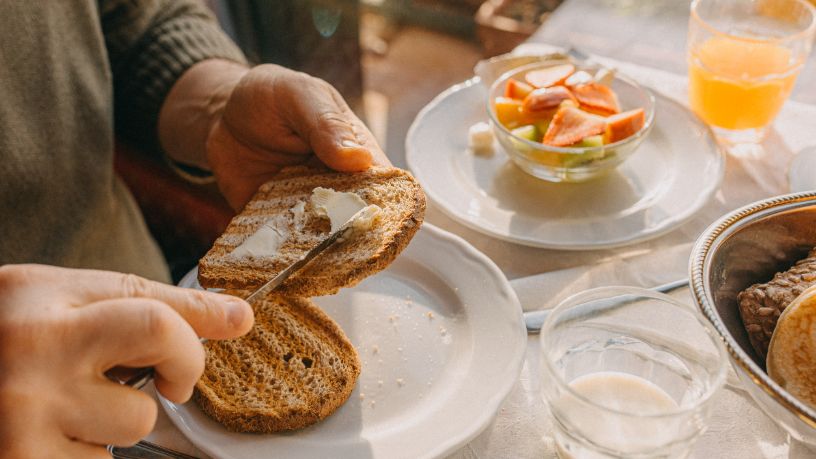High cholesterol can lead to some serious conditions, including heart disease, the leading cause of death in Australia.
On this page
Key takeaways
Our bodies actually need good cholesterol which we can get from certain foods.
Avoiding fried and high fat foods can help control bad cholesterol levels in our blood.
Have you been told your cholesterol is too high? A few changes to your diet can help lower cholesterol levels, improve your overall wellbeing and reduce your risk of some serious health conditions.
Why should we care about our cholesterol?
More than 2 in 5 Australian adults have high cholesterol.1
High cholesterol increases your risk of cardiovascular disease (heart attack and stroke), which is the leading cause of death in both men and women in Australia.2
What is cholesterol?
Cholesterol is a waxy, fat-like substance produced by your liver and carried in your blood. Your body needs cholesterol for essential processes including making hormones, bile and vitamin D. But too much of the wrong kind can be a health risk.
There are 2 main types of cholesterol:
- low density lipoprotein (LDL). LDL is also known as ‘bad’ cholesterol. When you have too much LDL cholesterol, it can block your arteries and increase your risk of heart disease and stroke.
- high density lipoprotein (HDL). HDL is known as ‘good’ cholesterol because it helps remove excess LDL cholesterol.
Because cholesterol has some essential functions in the body, you don’t want to eliminate it completely. Generally, what you’re aiming for is to have low levels of LDL cholesterol, and high levels of HDL cholesterol. That way, you can minimise the risk of fatty deposits accumulating in your arteries that can lead to cardiovascular disease.
How does diet impact our cholesterol?
While most cholesterol is produced in your liver, your LDL and HDL levels can also be affected by what you eat.
Bupa Dietitian Rosalyn D’Angelo says a healthy, balanced diet can help maintain normal cholesterol levels, while an unbalanced diet can contribute to high cholesterol levels.
“Eating a lot of saturated fat can increase your blood cholesterol, in particular the bad (LDL) cholesterol. Trans fats also increase the LDL cholesterol and lower the good (HDL) cholesterol in our blood. The way that some fats are processed can produce trans fats,” she says. “Trans fats also naturally occur in foods that come from animal sources such as beef, lamb and dairy.”
D’Angelo says common foods containing saturated and/or trans fats include:
- butter and cream
- biscuits, cakes and pastries
- deep fried food
- processed meats, fats on meat, and skin on chicken
- coconut oil, coconut milk and palm oil.
These foods can certainly be enjoyed on occasion, but need to be limited, especially if cholesterol is a concern for you.
How to reduce saturated fat in your diet
Reducing your saturated fat intake is crucial if you want to improve cholesterol levels. D’Angelo suggests:
- choosing lean cuts of meat, trimming any visible fat, and removing skin
- cutting back on meat and including more beans, lentils, legumes and fish in your diet
- being mindful of portion sizes, especially with processed or high fat foods
- swapping out some high fat foods for leaner alternatives such as making a grilled chicken salad instead of ordering battered fish and chips.
Are eggs high in bad cholesterol?
Eggs used to get a bad rap around their cholesterol content, but more recent research says in fact eggs are part of a healthy diet and have minimal effect on blood cholesterol levels.3
“Eggs are very nutritious. As long as you’re not adding a lot of oil or butter when preparing them” as both are high in saturated fats. For people who have heart disease, type 2 diabetes or high LDL cholesterol, the Heart Foundation recommends eating no more than 7 eggs per week.3
Foods for good cholesterol
D’Angelo says cutting out all fats is not the answer. Instead, we should replace the saturated fats in our diet with healthy, unsaturated ones.
“Healthy fats help to increase our good HDL cholesterol levels and lower our bad LDL cholesterol levels. Healthy fats are found in nuts, seeds, oily fish, olive oil, olives and avocado.”
“Fibre also blocks the reabsorption of cholesterol in the gut, which helps to lower cholesterol levels. So, include plenty of vegetables, fruits, legumes and whole grains.”
Healthy swaps and healthy additions
Eating for good cholesterol comes down to making some smart food swaps and increasing your intake of other healthy foods. D’Angelo says you should:
- replace butter on toast with avocado and sliced tomato
- swap bacon for salmon at breakfast
- choose wholegrain bread instead of white bread
- dress salads with extra-virgin olive oil
- sprinkle nuts, seeds and berries on top of your yoghurt or porridge
- have fish 2 to 3 times per week
- aim for 5 serves of vegetables and 2 serves of fruit every day.
In addition to making these healthy swaps, you can also eat foods that have plant sterols added to them. Plant sterols are natural compounds found in plant foods that help prevent cholesterol absorption in the gut.
The Heart Foundation says eating 2 to 3 grams per day in the form of enriched margarines, low-fat milk, yoghurt and breakfast cereals can help lower cholesterol by 5 to 10%.5 You’ll find these enriched foods in your local supermarket. If you’re considering including these foods in your diet, ask your doctor if they are appropriate for you.
Maintaining a healthy diet and lifestyle will go a long way towards achieving healthy cholesterol levels but for some people, it may not be enough. Your GP may want to monitor your cholesterol levels and if necessary, prescribe cholesterol-lowering medication. Speak to your doctor about how to maintain a healthy cholesterol balance.

At Bupa, trust is everything
Our health and wellbeing information is regularly reviewed and maintained by a team of healthcare experts, to ensure its relevancy and accuracy. Everyone's health journey is unique and health outcomes vary from person to person.
This content is not a replacement for personalised and specific medical, healthcare, or other professional advice. If you have concerns about your health, see your doctor or other health professional.
1Heart Foundation (2024). Key statistics: Risk factors for cardiovascular disease. Heart Foundation.
2Australian Institute of Health and Welfare (2023). Heart, stroke and vascular disease: Australian facts. Australian Government, Australian Institute of Health and Welfare.
3Heart Foundation (2020). Protein and heart health. Heart Foundation.
4Heart Foundation (2023). Fats, oils and heart health. Heart Foundation.
You might also like...
What you should know about cholesterol
Cholesterol might seem like the enemy of a healthy heart, but you actually need it to keep your body working. So, what is cholesterol and how does it work?
Butter vs margarine: A quick guide
It’s an age-old question: Which spread is healthier on your morning toast? We got the low-down on these sandwich staples.
Portion control: Does size really matter?
Trying to get to or maintain a healthy weight? It’s important to make sure you’re eating well-balanced meals and eating enough. Let’s talk portion control.
8 simple ways to stop sugar cravings
Are you prone to sugar cravings? Learn how to recognise a sugar craving and what to do when it strikes.





